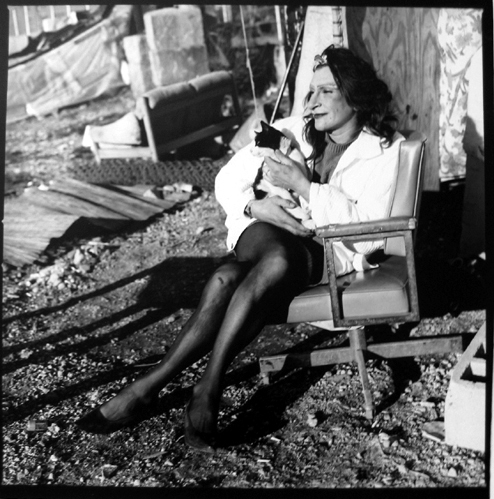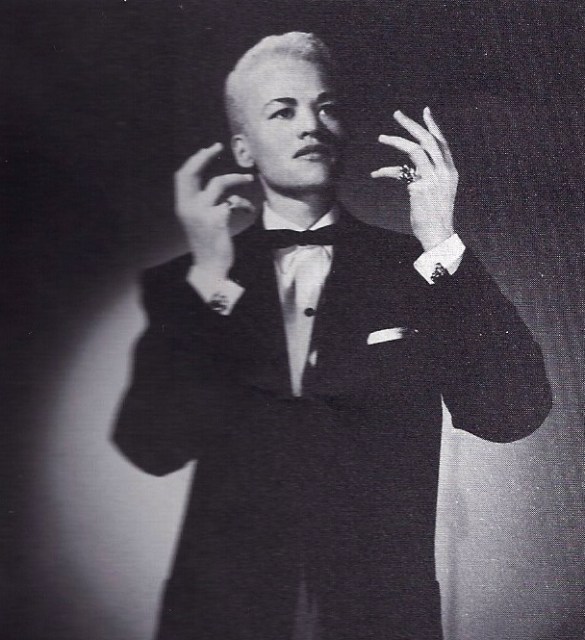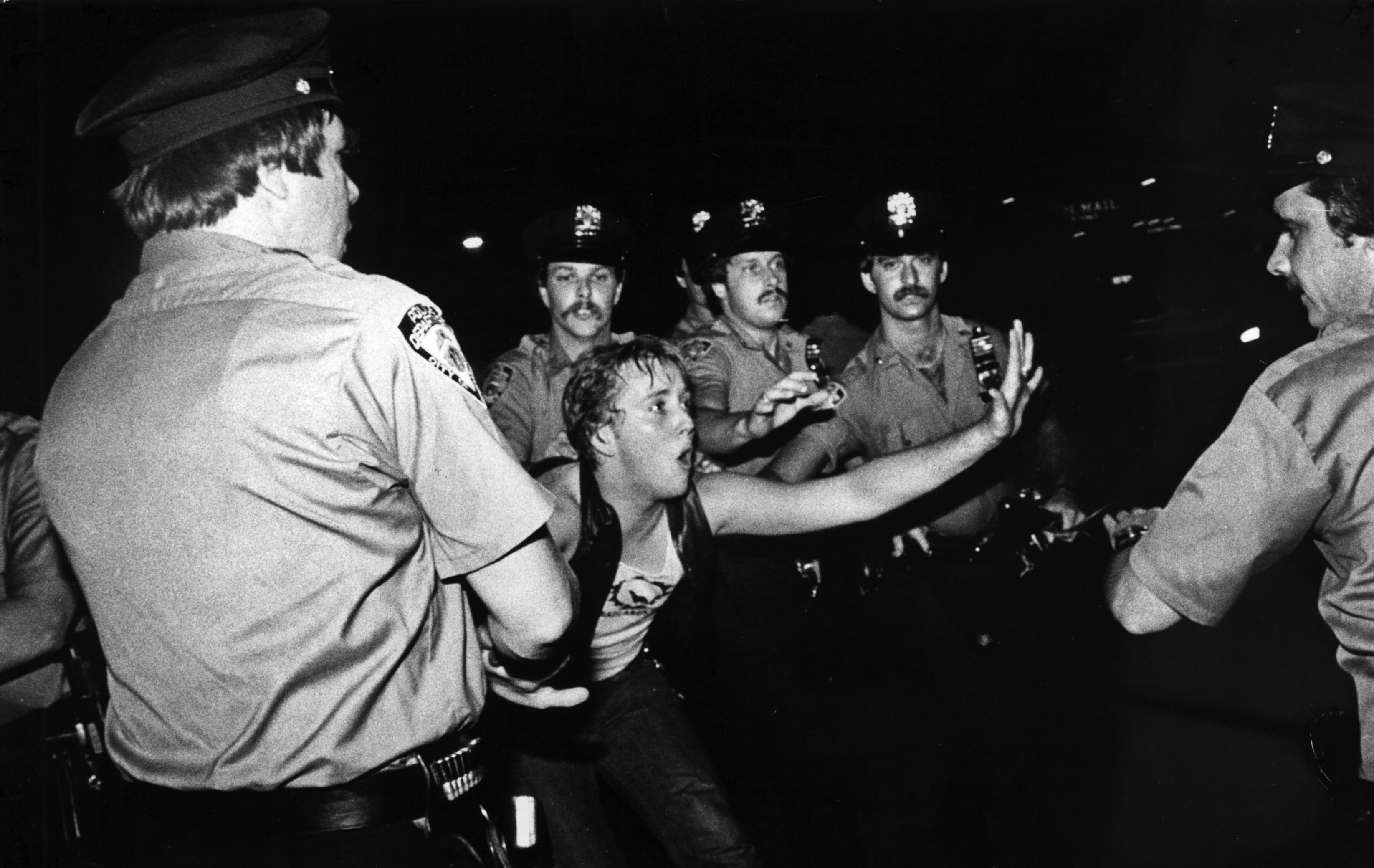Last week, Obama became the first president to ever mention gay rights in an inaugural address when — in between invocations of the Founding Fathers and Dr. King — he namechecked a few civil rights milestones:
“We, the people, declare today that the most evident of truths – that all of us are created equal – is the star that guides us still; just as it guided our forebears through Seneca Falls, and Selma, and Stonewall; just as it guided all those men and women, sung and unsung, who left footprints along this great Mall, to hear a preacher say that we cannot walk alone; to hear a King proclaim that our individual freedom is inextricably bound to the freedom of every soul on Earth.”
That line, combined with a later one about not giving up until “our gay brothers and sisters are treated like anyone else under the law,” got a lot of Earthly souls speculating about a lot of potential implications. Was the President hinting at future policy plans, or trying to secure a legacy? Is he giving the Supreme Court a not-so-subtle hint? Was it fair of him to lump such different movements together? Is alliteration absurdly annoying? Meanwhile, some, though excited by what Obama put into his speech, are equally concerned by who he left out — namely, trans* people, whom media coverage and the historical record have chronically left out as well. This is a terrible and self-perpetuating trend, and we’re in the middle of a great chance to reverse it. In her response to the inauguration, Melissa Harris-Perry talked about how “recognition is intrinsically valuable in a democracy, [as] mutual affirming recognition is the practice that allows citizens to operate as equals.” When the media fails to recognize the role trans* people have played in LGBT history, it fails to recognize and advance that equality.

Obama’s speech put Stonewall back into the public consciousness in a big way. According to Google Trends, the Internet has never talked about it this much, even on the Riots’ 40th anniversary in 2009. This means said Internet talkers — along with other journalists, historians, and informed conversationalists — are being given the chance to tell this very important story to an audience that is, however temporarily, really listening. Obama set up the alley-oop and now we have to dunk it. It’s a big responsibility.
A bigger and bigger one, because we’re in the information age, when if you want to find out about something quickly, you Google it. This means that increasingly, the agreed-upon story — the one that survives — isn’t necessarily the most correct one, or the one that’s told the best; instead, it’s the one that’s told the most. If you were among the curious millions who searched “Stonewall” in the past week, one of the first results you got was from NPR, and was entitled “Stonewall? Explaining Obama’s Historic Gay Rights Reference.” In the interest of those who missed the 60s, on whom “Obama’s reference was very likely lost,” NPR gave a quick primer on what happened when “gay men resisted police harassment at the Stonewall Inn gay bar in New York city.” In doing so, starting with that very first sentence, they struck a bunch of main players from the historical record. What about Stormé De Larverie, the “Stonewall Lesbian” who spurred the crowd’s initial surge when she resisted police outside the club? What about Tammy Novak, the trans* woman who threw some of the first punches? And what about David Van Ronk, a straight ally who hit an officer “with an unknown object”? Maybe, as the NPR article says, Stonewall itself “was not filled, as some accounts have it, with drag queens and street hustlers,” but perhaps that’s because, as trans* history blogger Zagria points out, a lot of them “could not afford the entry fee… [and] were often found in the parkette across the street, which turned out to be an ideal place to join in the riot.” In any case, it wasn’t only gay men resisting – not even close. And now everyone who heard Obama’s speech, cared enough to look up the reference, and trusted a generally good-hearted news source to educate them about it has missed out on a huge part of the story, and is still living in the dark about this and (presumably) many other hugely important contributions that trans* people have made to queer history and to America as a whole.

The NPR case is a strange one — their reporters have been specifically praised for trans* stories before, and pieces for their “Stonewall At 40” series a few years ago featured more accurate and inclusive retellings, as well as modern perspectives from trans* kids at the Ali Forney center. The author of this most recent piece, Liz Halloran, talked to historian and activist Martin Duberman, who wrote the first ever history of Stonewall and seemed in this interview to contradict his own previous work. But this case is just the most recent in a long line of similar ones that stretches across decades and media. Cristan at Transadvocate, in a fascinating and well-researched piece, points out that this particular erasure happens time and again, variously due to compounded oversight, as a response to what some apparently see as a false co-opting of gay history by trans* people, or because of plain old ill intent.
As Crista puts it, “this isn’t the first time the Stonewall movement has been retold as being the Ciswall movement.” Erasure started directly after the riots. Some came from outside sources, like New York Times reporters, who didn’t understand or prioritize complexities of identity and just called everyone “men” in articles that are now primary sources. Some came from within the LGBT community, which, dusting itself off and finding that it suddenly was a community, suffered from infighting — RadFems and Lesbian Liberation Movement members fought with trans* women; there were brawls for the mic at pride parades. Later, when the first LGBT historians were compiling what would become the first official narratives, some, like Wayne Dynes, confused a lack of static terminology (there have been many words for “trans*” over the years) for a lack of existence (others did the same with a lack of photographs).

The strangest thing about all this, is Stonewall is so important partly because that’s when we started to realize how in-it-together we were. In one of the older, better NPR Stonewall articles, Michel Martin interviews Danny Garvin, who was also a part of the riots. Garvin says that, before Stonewall, “we never realized how connected we were as a community. That it didn’t make a difference if you were a drag queen, or if you were a leather queen, or if you were just a young kid, or if you were an older person over 30, we were all fighting for a right… to get back into the bar, to be able to dance, not be oppressed.” The way we talk about Stonewall should reflect that, and celebrate it. Why would any of us ever want to do otherwise?
When it comes to trans* rights, Obama has a fairly good track record, or at least one better than any other president’s. At the White Houses’s 40th anniversary Stonewall event, he hosted representatives from the National Center for Transgender Equity and the Sexual Minority Youth Assistance League, and specifically thanked those who work “in pursuit of equality on behalf of the millions of people in this country who work hard and care about their communities — and who are gay, lesbian, bisexual, or transgender.” I’m guessing that he knew what he was doing with that particular reference; that, even if he didn’t spell it out (and I wish he had), he actually believes in the freedom of every soul, and knows something about all the different kinds of forebears who were at Stonewall. But not everybody does, and it’s the rest of our responsibility to fix that. As trans* activist Gwendolyn Ann Smith put it, Obama’s speech was “a call to action,” showing how necessary it is for trans* people “to secure our history and work toward our future.” The two go together, and those privileged with telling this history need to stay aware of this.








Comments
I love everything about this article.
I am glad to see the search numbers for Stonewall rise after the speech, even though the results could be better…Stonewall was something that I had never even heard about until I was researching LGBT history on my own while coming out. Hopefully people who are interested will read around and check different sites to form a more complete picture of what went down.
Great article.
This is exactly why I love Autostraddle despite its occasional lapses into cissexism.
Let me preface this by saying I’m not attacking you or anything. How/when is Autostraddle cissexist?
Thank you for writing this. I saw that NPR article and was so disappointed so I’m glad my favorite website is addressing that erasure.
I feel like it isn’t just NPR, but plenty of other news outlets that have engaged in this disappointing reporting. Hopefully Obama’s second term is one that takes great strides in securing the rights of trans* people and also a time where we can tell the story of our history more accurately.
Moreover, is it queer specific news outlets that you refer to or just news in general? Admittedly, many “queer” news outlets are really just implements of the gaytriarchy and rarely address seriously (if at all) news relevant to other elements of the alphabet soup.
I hope you are right about Obamas next term and that the trends towards social justice continue.
“gaytriarchy” is a brilliant word.
It is indeed brilliant however it is not my word and I expect that you are equally welcome to use it liberally at appropriate times.
Thank you for this article. I was also saddened and surprised by the NPR article.
“This means that increasingly, the agreed-upon story — the one that survives — isn’t necessarily the most correct one, or the one that’s told the best; instead, it’s the one that’s told the most.”
This is so true and so frustrating.
That is history through and through. =\
Kudos to you Cara. This is an amazingly written article! Now I have plenty more to read tonight.
Thanks, Kristen! While you’re reading, I’ll be making bobotie, so we’re even.
Really great article. It’s definitely important to call people on outlets on this sort of thing. We have a hard enough time getting positive media exposure as it is!
Something really small to note though. Trans woman should be two words (as in “What about Tammy Novak, the trans woman who threw some of the first punches?” and “RadFems and Lesbian Liberation Movement members fought with trans women”)
Thank you, Evey! I just went back and fixed it. Sorry about that!
You are correct but that leads to editing much more in such a case, with the (only fair!) specification of cis persons in the article. Perhaps an article such as this needs that distinction?
Thanks for this piece Cara. Halloran’s article was mediocre reporting, but there have been other disturbing instances of ‘cis-washing’ and ‘white-washing’ Stonewall (as Duberman’s book did, big time) like the recent documentary “Stonewall Uprising” which gave a horribly limited view of the events and, sadly, was selected to be shown and re-shown on Public Broadcasting despite a number of commentators who called it out for its white/cis perspective. And even though I recently posted this in another AS thread, I want to again mention that there was fightback from trans and gender variant people BEFORE Stonewall, like the Cooper’s Donuts incident in LA in 1959, Dewey’s Cafeteria protest in Philly and, of course, Compton’s Cafeteria in SF in ’66. All of these were important acts of resistance in their communities and no less important because they didn’t happen in New York. Making Stonewall the center of all queer/trans resistance is over-simplified history.
Also, one of the trans women who was at Stonewall (and a close friend of Sylvia Rivera) was Christina Hayworth, a trans latina from Puerto Rico. It’s recently been reported that she is living in extreme poverty on that island, and her plight has been largely ignored by the Puerto Rican version of ‘Gay Inc.’ http://blabbeando.blogspot.com/2013/01/as-obama-salutes-stonewall-stonewall.html#.UQXHLUrBPlx
Stonewall in the UK is one of the largest and well-known LGB rights network in the country: http://www.stonewall.org.uk/
They have prestigious awards, countless campaigns and much political influence.
They even have a university guide to help you choose the most LGB-friendly university.
WHERE IS THE T IN LGBT. It’s invisible.
Hopelesscynic, that organization (Stonewall) also honored a big time transphobe in Julie Bindel, and refused to even see how that might be problematic. They have pretty much decided to not encompass trans people in their work although the Scottish branch of Stonewall has split off from its English version and does support trans issues. Yes, it’s disgusting they appropriated the name of Stonewall for their own limited agenda.
I have previously dealt with this “rights” network, in particular regarding sex/gender diverse persons. This misappropriated “Stonewall” disgusts me – what an awful bunch of cissies!
I was SUPER disappointed in NPR’s Robert Smith in his interview with Big Freedia for this same reason. After Big Freedia credited Katey Red with being the first trans bounce artist, and that they together are responsible for it’s crazy popularity, Robert Smith said, “Wait, why, why? NOLA has a rich gay culture, why would it be such a big deal for two gay men to be making music together.”
Ummmm… BECAUSE THEY’RE NOT. Thanks for changing Katey Red’s whole identity, and the Queen Diva on top of that. Stop the transphobia, NPR.
Some of those mentioned in the article identified as gay not trans, in their own words. If you are sticking to the history this is an important detail, how an individual personally identified. Not Cool not acknowledging trans comtributions, but your article re-writing history? Please don’t do that.
Greetings! I simply want to offer huge thumbs up for the great stuff you have got here on this post. It looks perfect and I agreed with the topics you just said. Thanks for the share. But if you guys want Top Mobile App Development Services Company India than contact us.
I’m not that much of an online reader to be honest but your sites really nice, keep it up! I’ll go ahead and bookmark your site to come back later on. Pradhan Mantri Jan Dhan Yojana Then visit our website.
All about CNC machining process and alternatives, components and tooling of their parts and products along with the necessary technical. Get all these by calling on +91 8484 000 003
Greetings! I simply want to offer huge thumbs up for the great stuff you have got here on this post. It looks perfect and I agreed with the topics you just said. Thanks for the share. But if you guys want best web hosting service than contact us.
This is pretty well impressive thing I have found here. It looks cool and I agreed with the topics you just said. Thanks for the share. but if you guys want Hire Sign Shop in Birmingham then contact Us.
Greetings! I simply want to offer huge thumbs up for the great stuff you have got here on this post. It looks perfect and I agreed with the topics you just said. Thanks for the share. But if you guys want GST Registration For Small Business than contact us.
You won’t find better than our swing chair patiofy swing chairs baby rockers, baby cradle swings, Swing for balcony India. Shop now and enjoy free standard delivery.
Looking for Regina homes or condos for sale? The yourhomes yourhomes Team can help you. Our intimate knowledge of the city and experiences of having lived here gives us enthusiasm and desire to help our clients make our home, their home as well.
Hey admin
What a Great article keep it up with awesome stuff like this.
You have clearly mentioned all the things and guys if you want
24newsdaily , How to Put a Curse on Someone than visit our blog as well thanks.
Greetings! I simply want to offer huge thumbs up for the great stuff you have got here on this post. It looks perfect and I agreed with the topics you just said. Thanks for the share. But if you guys looking for best construction company in Jamshedpur than contact us.
Greetings! I simply want to offer huge thumbs up for the great stuff you have got here on this post. It looks perfect and I agreed with the topics you just said. Thanks for the share.
Great post! I really enjoyed reading your blog post. I also appreciate the practical tips you provided. Keep up the great work!
credit for this ans kamree than contact us.